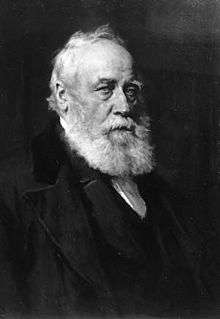William Forbes Skene

William Forbes Skene (7 June 1809 – 29 August 1892), was a Scottish historian and antiquary.
Life
He was the second son of Sir Walter Scott's friend, James Skene (1775–1864), of Rubislaw, near Aberdeen.
He was educated at Edinburgh Academy in Edinburgh and at the University of St Andrews, taking an especial interest in the study of Celtic philology and literature. In 1832, he became a Writer to the Signet (WS), and shortly afterwards obtained an official appointment in the bill department of the Court of Session, which he held until 1865. His early interest in the history and antiquities of the Scottish Highlands bore its first fruit in 1837, when he published The Highlanders of Scotland, their Origin, History and Antiquities.
In 1847, during the Highland Potato Famine, he was appointed Secretary to the Central Board for Highland Relief. In this position he worked closely with Sir Charles Trevelyan, Assistant Secretary to the Treasury.
His chief work, however, is his Celtic Scotland, a History of Ancient Alban (3 vols., Edinburgh, 1876–1880), perhaps the most important contribution to Scottish history written during the 19th century. In 1879 he was made a Doctor of Civil Law (DCL) of the University of Oxford, and in 1881 Historiographer Royal for Scotland.
William Forbes Skene was a leading member of the congregation of St Vincent’s Scottish Episcopal Church in St Vincent Street in Edinburgh's Northern New Town. He is commemorated by a prominently placed memorial on the south wall of the nave. An avowed Evangelical, he had argued that, since the Scottish Episcopal Church’s General Synod of 1863 had established the English Book of Common Prayer as the primary authority for the Church’s worship and the Scottish Episcopal Church had adopted the Church of England’s Thirty Nine Articles as a doctrinal yardstick, for St Vincent’s to remain outside that church could no longer be justified.[1]
He died in Edinburgh on 29 August 1892.
The most important of Skene's other works are: editions of John of Fordun's Chronica gentis Scotorum (Edinburgh, 1871–1872); of the Four Ancient Books of Wales (Edinburgh, 1868); of the Chronicles of the Picts and Scots (Edinburgh, 1867); and of Adomnán's Vita S. Columbae (Edinburgh, 1874); an Essay on the Coronation Stone of Scone (Edinburgh, 1869); and Memorials of the Family of Skene of Skene (Aberdeen, 1887). One of Skene's harshest critics was the Scottish philologist Alexander Macbain.
See also
- MS 1467, a mediaeval Gaelic manuscript 'discovered', transcribed, and translated by Skene
Notes
- ↑ History of St Vincent's Chapel, 2008 Gifford, Milner and Wilsher.
References
- "Skene, William Forbes." British Authors of the Nineteenth Century H. W. Wilson Company, New York, 1936.
 This article incorporates text from a publication now in the public domain: Chisholm, Hugh, ed. (1911). "article name needed". Encyclopædia Britannica (11th ed.). Cambridge University Press.
This article incorporates text from a publication now in the public domain: Chisholm, Hugh, ed. (1911). "article name needed". Encyclopædia Britannica (11th ed.). Cambridge University Press.
External links
| Wikisource has original works written by or about: William Forbes Skene |
- "
 Skene, William Forbes". A Short Biographical Dictionary of English Literature. Wikisource. 1910
Skene, William Forbes". A Short Biographical Dictionary of English Literature. Wikisource. 1910  "Skene, William Forbes". Dictionary of National Biography. 1885–1900.
"Skene, William Forbes". Dictionary of National Biography. 1885–1900. - Skene, William Forbes (1837), Macbain, Alexander, ed., The Highlanders of Scotland, Stirling: Eneas Mackay (published 1902)
- Skene, William Forbes, ed. (1847), Collectanea de Rebus Albanicis, Consisting of Original Papers and Documents Relating to the History of the Highlands and Islands of Scotland, Edinburgh: Thomas G. Stevenson
- Skene, William Forbes (1862), "Introduction and Additional Notes", in M'Lauchlan, Thomas, The Dean of Lismore's Book: A Selection of Ancient Gaelic Poetry, Edinburgh: Edmonston and Douglas, pp. i–xc, 137–152
- Skene, William Forbes, ed. (1867), Chronicles of the Picts, Chronicles of the Scots, and Other Early Memorials of Scottish History, Edinburgh: Edinburgh General Register House
- Skene, William Forbes (1868), The Four Ancient Books of Wales, I, Edinburgh: Edmonston and Douglas
- Skene, William Forbes (1868), The Four Ancient Books of Wales, II, Edinburgh: Edmonston and Douglas
- Skene, William Forbes (1869), The Coronation Stone, Edinburgh: Edmonston & Douglas
- Skene, William Forbes (1869), The Gododdin Poems, Forgotten Books (published 2007), ISBN 1-60506-167-0
- Skene, Felix James Henry; Skene, William Forbes (1872), John of Fordun's Chronicle of the Scottish Nation, Edinburgh: Edmonston and Douglas
- Skene, William Forbes (1884), The Gospel history for the young, being lessons on the life of Christ adapted for use in families and in Sunday Schools, I, Edinburgh: Douglas
- Skene, William Forbes (1884), The Gospel history for the young, being lessons on the life of Christ adapted for use in families and in Sunday Schools, II, Edinburgh: Douglas
- Skene, William Forbes (1884), The Gospel history for the young, being lessons on the life of Christ adapted for use in families and in Sunday Schools, III, Edinburgh: Douglas
- Skene, William Forbes, ed. (1887), Memorials of the Family of Skene of Skene, Aberdeen: New Spalding Club
- Skene, William Forbes (1886), Celtic Scotland: A History of Ancient Alban (History and Ethnology), I (2nd ed.), Edinburgh: David Douglas
- Skene, William Forbes (1887), Celtic Scotland: A History of Ancient Alban (Church and Culture), II, Edinburgh: David Douglas
- Skene, William Forbes (1890), Celtic Scotland: A History of Ancient Alban (Land and People), III (2nd ed.), Edinburgh: David Douglas
- Skene, William Forbes (1891), The Lord's Supper and The Passover Ritual; Being a Translation of the Substance of Professor Bickell's Work Termed "Messe Und Pasha.", Edinburgh: T. & T. Clark
- Skene, William Forbes (1905), East Neuk Chronicles, Aberdeen: "Aberdeen Journal" and "Evening Express"